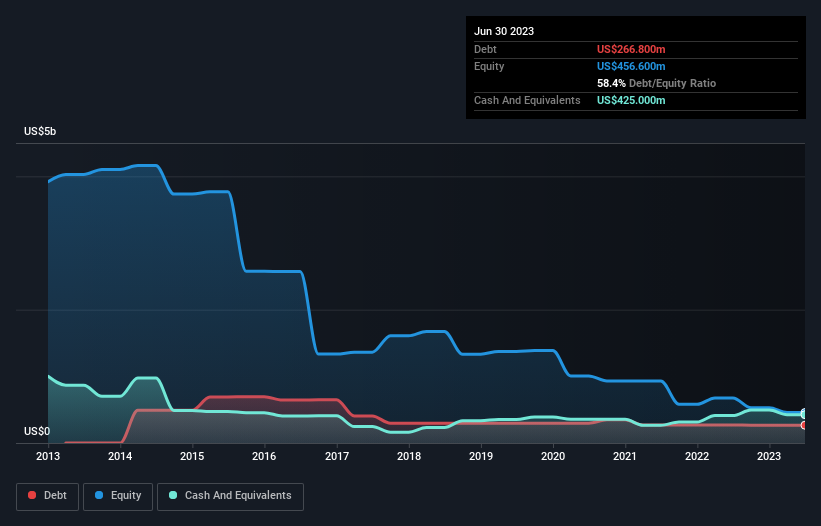Some say volatility, rather than debt, is the best way to think about risk as an investor, but Warren Buffett famously said that 'Volatility is far from synonymous with risk.' So it might be obvious that you need to consider debt, when you think about how risky any given stock is, because too much debt can sink a company. We note that Genel Energy plc (LON:GENL) does have debt on its balance sheet. But should shareholders be worried about its use of debt?
What Risk Does Debt Bring?
Debt is a tool to help businesses grow, but if a business is incapable of paying off its lenders, then it exists at their mercy. In the worst case scenario, a company can go bankrupt if it cannot pay its creditors. However, a more common (but still painful) scenario is that it has to raise new equity capital at a low price, thus permanently diluting shareholders. By replacing dilution, though, debt can be an extremely good tool for businesses that need capital to invest in growth at high rates of return. The first step when considering a company's debt levels is to consider its cash and debt together.
View our latest analysis for Genel Energy
What Is Genel Energy's Net Debt?
As you can see below, Genel Energy had US$266.8m of debt, at June 2023, which is about the same as the year before. You can click the chart for greater detail. But it also has US$425.0m in cash to offset that, meaning it has US$158.2m net cash.

A Look At Genel Energy's Liabilities
The latest balance sheet data shows that Genel Energy had liabilities of US$71.4m due within a year, and liabilities of US$327.2m falling due after that. Offsetting these obligations, it had cash of US$425.0m as well as receivables valued at US$100.6m due within 12 months. So it actually has US$127.0m more liquid assets than total liabilities.
This surplus liquidity suggests that Genel Energy's balance sheet could take a hit just as well as Homer Simpson's head can take a punch. Having regard to this fact, we think its balance sheet is as strong as an ox. Simply put, the fact that Genel Energy has more cash than debt is arguably a good indication that it can manage its debt safely. When analysing debt levels, the balance sheet is the obvious place to start. But it is future earnings, more than anything, that will determine Genel Energy's ability to maintain a healthy balance sheet going forward. So if you want to see what the professionals think, you might find this free report on analyst profit forecasts to be interesting.
In the last year Genel Energy had a loss before interest and tax, and actually shrunk its revenue by 44%, to US$238m. That makes us nervous, to say the least.
So How Risky Is Genel Energy?
Although Genel Energy had an earnings before interest and tax (EBIT) loss over the last twelve months, it generated positive free cash flow of US$100m. So although it is loss-making, it doesn't seem to have too much near-term balance sheet risk, keeping in mind the net cash. We'll feel more comfortable with the stock once EBIT is positive, given the lacklustre revenue growth. When analysing debt levels, the balance sheet is the obvious place to start. But ultimately, every company can contain risks that exist outside of the balance sheet. For example - Genel Energy has 2 warning signs we think you should be aware of.
At the end of the day, it's often better to focus on companies that are free from net debt. You can access our special list of such companies (all with a track record of profit growth). It's free.
New: Manage All Your Stock Portfolios in One Place
We've created the ultimate portfolio companion for stock investors, and it's free.
• Connect an unlimited number of Portfolios and see your total in one currency
• Be alerted to new Warning Signs or Risks via email or mobile
• Track the Fair Value of your stocks
Have feedback on this article? Concerned about the content? Get in touch with us directly. Alternatively, email editorial-team (at) simplywallst.com.
This article by Simply Wall St is general in nature. We provide commentary based on historical data and analyst forecasts only using an unbiased methodology and our articles are not intended to be financial advice. It does not constitute a recommendation to buy or sell any stock, and does not take account of your objectives, or your financial situation. We aim to bring you long-term focused analysis driven by fundamental data. Note that our analysis may not factor in the latest price-sensitive company announcements or qualitative material. Simply Wall St has no position in any stocks mentioned.
About LSE:GENL
Genel Energy
Operates as an independent oil and gas exploration and production company.
Flawless balance sheet with reasonable growth potential.
Similar Companies
Market Insights
Community Narratives



